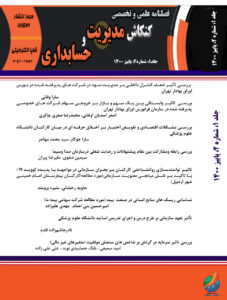مقاله: پژوهشی
صفحه: 402- 423
نویسندگان:
عبدالله توکلی[1] ، ایرج ایسوند*[2]
[1] دانشیار/ گروه مدیریت / علوم اجتماعی/ پژوهشگاه حوزه و دانشگاه atavakkoli@rihu.ac.ir)
[2] دکتری مدیریت دولتی،گرایش رفتار سازمانی،دانشگاه تهران،ایران ،مدرس دانشگاه،مسئول ممیزی مدیریت درمان تامین اجتماعی استان خوزستان(نویسنده مسئول) iraj.esvand@ut.ac.ir
چکیده
مطالعه حاضر با هدف ارائه مدل جامع پیشایندها و پیامدهای انصاف سازمانی انجام شده است. این پژوهش از لحاظ هدف کاربردی و از لحاظ ماهیت و شکل اجراء، توصیفی-پیمایشی است. جامعه آماری این تحقیق كليه مدیران ارشد و کارشناسان سازمان تامین اجتماعی اهواز به تعداد 413 نفر میباشند که از این میان، نمونهای متشکل از 200 نفر با استفاده از فرمول کوکران انتخاب شده است. در این مطالعه برای جمعآوری اطلاعات جهت آزمون فرضیات از پرسشنامهای محقق ساخته شامل 9 بعد و 33 سوال استفاده شده است که بر مبنای طیف لیکرت پنج درجه تدوین شده است. روایی پرسشنامه با استفاده از روش روایی محتوا مورد تایید قرار گرفت. برای ارزیابی پایایی پرسشنامه، ضریب آلفای کرونباخ محاسبه شد. ضریب آلفای کرونباخ بیش از 7/0 بدست آمد که نشان میدهد پرسشنامه از پایایی مطلوبی برخوردار است. آزمون کولموگروف-اسمیرنف و آزمونهای چولگی و کشیدگی نشان داد که دادهها از توزیع نرمال پیروی میکنند. برای آزمون فرضیات از تکنیک مدلسازی معادلات ساختاری و نرم افزار لیزرل 2 استفاده شده است. نتایج حاصل از این تحلیل نشان داد که ارزشهای سازمانی، اخلاق سازمانی و فرهنگ سازمانی بعنوان پیشایندهای انصاف سازمانی عمل میکنند. همچنین نتایج نشان داد که انصاف سازمانی بر رضایت شغلی، رفتار شهروندی سازمانی، تعهد سازمانی، تعلق خاطر شغلی و توانمندسازی روان شناختی تاثیر مثبت و معنیداری دارد. آزمون برازش مدل نشان داد که مدل پیشنهادی از برازش مطلوبی برخوردار است.
کلمات کلیدی:
انصاف سازمانی، رضایت شغلی، ارزشهای سازمانی، توانمندسازی روان شناختی
organizational fairness; The concept, antecedents and consequences in social security organization of Khuzestan province
Abdullah Tavakoli[1], Iraj Issund*[2]
[1] Associate Professor/Department of Management/Social Sciences/Research Institute and University atavakkoli@rihu.ac.ir)
[2] Ph.D. in public administration, organizational behavior orientation, University of Tehran, Iran, university teacher, responsible for social security treatment management audit in Khuzestan province (corresponding author) iraj.esvand@ut.ac.i
abstract
Keywords:
Organizational fairness, job satisfaction, organizational values, psychological empowerment
